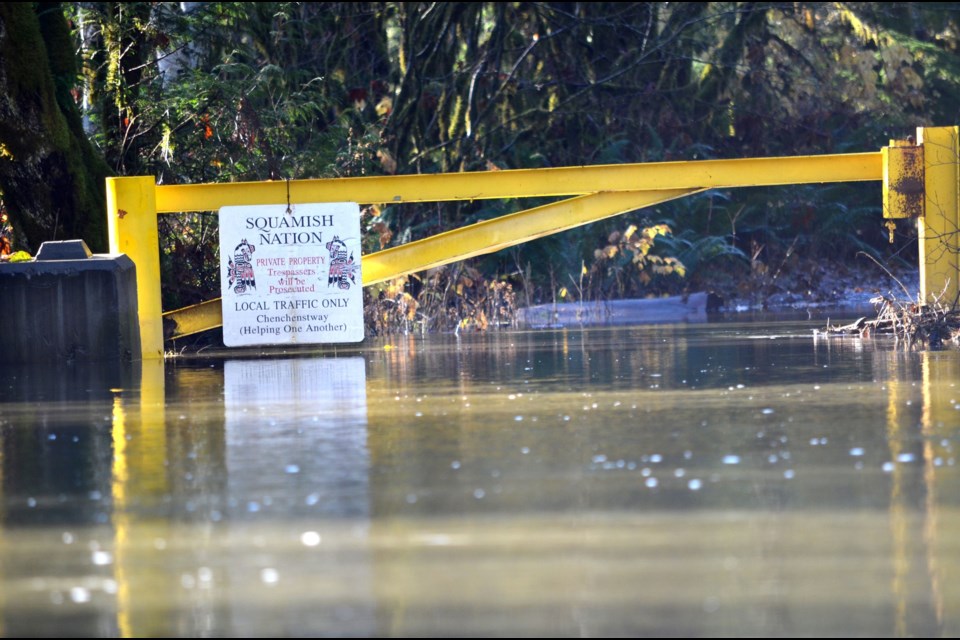Squamish has a lot of natural hazards.
We know this.
We also know that natural disasters are increasing in frequency and severity due to climate change.
And we know that floods are a likely nemesis for us.
We watched on Nov. 14 as the unending rain turned to floods in the Fraser Valley and threatened areas of the Cheekye Reserve.
But how many of us have personally prepared for a flood?
A recent national Ipsos survey found only three in 10 (29%) Canadians aged 25 to 55 have a household emergency plan.
Only 11% of Canadians polled have taken steps to reduce the effects of weather-related risks — like floods — to their homes.
Spring is often the peak flood season.
Thus, a new national advertising campaign from Public Safety Canada is being launched to inform and educate folks about these risks and prepare for them.
"We've known for a long time what can be done," said Nic Defalco, a spokesman from Public Safety Canada.
"Around our properties, we can take steps to mitigate flooding by taking a walk around our property, checking window seals that are at the ground level or door seals that are at the ground level and making sure that the seal is intact and not cracked or dried out. So that way, you're keeping water out."
Keeping eavestroughs clear is important, too.
"Making sure that they're clean, but also making sure that they're running water at least two metres away from your house or your property. That gives you that upper zone so that the water can actually reabsorb...That gives you that little bit of time so that the water can move down into the soil. And, and slowly reabsorbed rather than, you know, making your basement a mess."
Defalco also said folks should go through their basement to double-check that the basement drain isn't blocked in any way so that if water does come in, it has somewhere to go."
The average basement flood costs homeowners about $40,000, he added.
In Squamish, where many store expensive recreation equipment, a flood could be even more devastating.
"Bike chains do not like water and suspension doesn't like water, if it's a mountain bike. And you know, if you have a hydraulic disc brake on there, it also doesn't like water," Defalco said, noting he was speaking from experience on this one.
You can protect your valuables in plastic containers and by getting expensive items up off the floor, he added.
If you aren't sure your personal level of risk on your property, reach out to the District of Squamish (or whatever municipality you live in) for that information, he said.
It's important to be prepared to survive at home for several days in case of any natural disaster.
"Have a battery-powered radio or crank radio so that you can listen to first responders because that's also important. First responders are going to know what's going on. They're going to give you a better direction because they have the global view as opposed to what you just see out your window."
If it does flood
In the event of a flood, it's essential "to get the cleanup equipment out, ventilate, dehumidify. Clean walls and floors as quickly as possible, because this isn't clean water either. So, it's important to start disinfecting; if you have carpets on the floor, get them off the floor."
Talk to your insurance company to make sure what level of coverage you have and if you're covered for flooding.
Asked about folks who can't secure flooding insurance, Defalco pointed to a federal task force that has been struck to address this issue.
Prime Minister Justin Trudeau has instructed the Minister of Public Safety and Emergency Preparedness and the Minister of Families, Children and Social Development to create a new, low-cost national flood insurance program for homeowners at high risk of flooding who do not have adequate insurance protection.
They are also to develop a national action plan to assist homeowners with potential relocation for those at the highest risk of repeat flooding, Defalco said.
A final report is expected this spring.
Ultimately, Canadians tend to prepare for the best and hope for the best, but we need to reverse that, he said.
"What we need to start doing is prepare for the worst and hope for the best. But I mean, we've seen that several times over the last decade. We're getting better at preparing, but we still have some ways to go."
For more information on preparing, go here.




